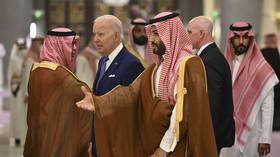Calls for US to punish Saudi Arabia grow

US Senator Richard Blumenthal and Representative Ro Khanna have accused Saudi Arabia of “colluding” with Russia by cutting OPEC oil production quotas, supposedly to boost Moscow’s energy revenue. The two high-profile Democrats called for weapons sales to be stopped, in order to punish Riyadh.
“America shouldn’t be providing such unlimited control of strategic defense systems to an apparent ally of our greatest enemy – nuclear bomb extortionist [Russian President] Vladimir Putin,” Blumenthal, Khanna and Yale business professor Jeffrey Sonnenfeld wrote on Sunday in a Politico op-ed. They added that they will propose Senate and House legislation on Tuesday to immediately halt US arms sales to Saudi Arabia.
On Monday, Senate Foreign Relations Committee Chairman Bob Menendez also called on the US government to freeze all aspects of its cooperation with Saudi Arabia. “There simply is no room to play both sides of this conflict,” he said, adding that he “will not green light any cooperation with Riyadh until the Kingdom reassesses its position with respect to the war in Ukraine.”
At issue is OPEC’s decision last week to cut member state oil production by 2 million barrels a day, attributed to rising interest rates in the West and a slumping global economy.
With the US inflation rate near a 40-year high and congressional midterm elections approaching next month, President Joe Biden had urged Saudi Arabia to help push down crude prices.
Blumenthal and Khanna, who serve on Armed Services Committees on Capitol Hill, noted that members of Congress had launched unsuccessful moves to halt weapons sales to Riyadh in the past. “Due to intense bipartisan blowback to Saudi’s collusion with Russia, we think this time is different,” the op-ed said.
The OPEC production cut was a “pointed blow” to the US, the three authors added, arguing that the oil cartel had never before reduced quotas amid such a tight supply-demand balance in crude markets. “There was no immediate need for Saudi Arabia to reduce supply unless they were seeking to harm the US to the benefit of Russia.”
Three congressional Democrats – Sean Casten, Tom Malinowski, and Susan Wild – introduced a House bill late last week calling for the US to withdraw its troops and missile defense systems from Saudi Arabia and the United Arab Emirates.
“Saudi Arabia and the UAE’s drastic cut in oil production, despite President Biden’s overtures to both countries in recent months, is a hostile act against the United States and a clear signal that they have chosen to side with Russia in its war against Ukraine,” the lawmakers said.
Blumenthal and Khanna said the US would rather keep its troops in Saudi Arabia, than let Russia or China fill the void. They argued that the kingdom’s alleged support for Russia “should spark a far-reaching review of the US-Saudi relationship.”














